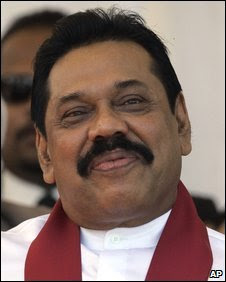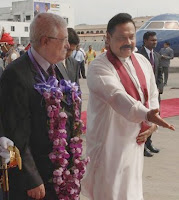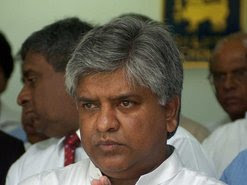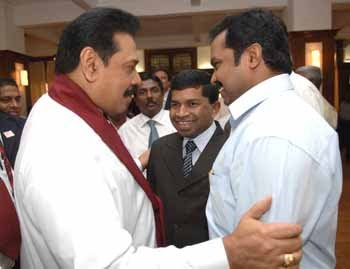People in many countries believe in astrology, but horoscopes have a particularly enthusiastic following in Sri Lanka.
Many consult astrologers when choosing marriage partners, on when to start new jobs, or even to find out the auspicious time to leave their house in the morning. And politicians are said to be heavily influenced by the stars too.
At a wedding hall in Colombo, a bride and groom are sitting on a stage brightly decorated with paintings of Hindu gods. At their feet, several Hindu priests are breaking coconuts and lighting oil lamps, performing rituals to invoke blessings on the couple. The invitation was very precise, the ceremony would take place at what was described as the auspicious time of 1109 local time, as set by astrologers.
It was an arranged marriage, and astrology had been a key factor in deciding whether Vijayaruban and Umaranjini should wed. Their horoscopes had been examined to see if they were compatible. "It matched 85% or something," said Vijayaruban. "So it is a good thing. Both sets of parents are happy and we are happy." If the horoscopes had not been so attuned, he added, the family would have tried to find another girl for him to marry.
Astrological passport
Astrologers play a significant role in the lives of Sri Lankan people from the Tamil and Sinhala communities.
Eshwaran Kurukkal is the sixth generation in his family to perform the task, which is combined with priestly duties such as officiating at weddings. He is a member of the Brahmin caste. Every day, but especially on auspicious days, people come to visit him in his consulting rooms in his suburban Colombo house.
The astrologer wears traditional dress - a white sarong with a purple and gold border. He is bare-chested, with gold necklaces and diamond stud earrings. His long hair is pulled back, and his wrists, elbows, shoulders and forehead have three white stripes, marked with powder.
Mr Eshwaran is examining a client's horoscope, a printed book about the size of a passport. Inside there are sections for name, names of parents, and the positions of the stars and planets at the date and precise time of birth.
Many people keep the documents throughout their lives.
"We think if we didn't write a horoscope for a child when the child was born, it would be a very big sin," says Mr Eshwaran. "That is important, more important than a birth certificate."
Political star gazers
Belief in the stars is widespread in Sri Lanka where people routinely sit down to start work on the first day of a new job at auspicious times set by astrologers.
Even many politicians follow astrology, right up to heads of state.
"[Former president Ranasinghe] Premadasa was very much aware of astrological predictions for him, and would very often make his actions commensurate with that," says Bradman Weerakoon, who served as secretary or advisor to nine Sri Lankan leaders.
Mr Weerakoon says he is sure that Sri Lanka's first woman prime minister, Sirimavo Bandaranaike, was astrologically inclined and that current President Mahinda Rajapaksa is also "perhaps moved that way".
"I am sure elections, dates of elections and so on are very often set on politicians getting their horoscopes read and finding out what is the best time for them."
Of the leaders he has encountered, Mr Weerakoon says only opposition leader Ranil Wickremesinghe does not seem to be inclined towards astrology.
'Hero king'
It is to astrologer Sumanadasa Abeygunawardene that many politicians have turned.
He says he even advised President Rajapaksa on the auspicious time to leave his house in the deep south to vote in the 2005 elections in which he became Sri Lanka's leader.
"Twenty-five years back, I said there would be a hero king from Ruhuna, Matara, now he's the one, we believe, President Mahinda Rajapaksa," said Mr Abeygunawardene.
"So President Rajapaksa's horoscope is a powerful one. He is the one who will bring development to the country. He will defeat the enemies and terrorists."
Mr Abeygunawardene said he had seen the horoscope of Velupillai Prabhakaran, the leader of the Tamil Tigers.
He said the rebel's horoscope was more powerful than those of previous Sri Lankan presidents, but Mahinda Rajapaksa's was stronger still.
Back in the wedding hall, Vijayaruban and Umaranjini were just hoping their marriage would be successful.
Even though they did not know each other very well, they were confident they will have a happy life together.
It was, after all, written in the stars.
(By Roland Buerk, BBC News)















